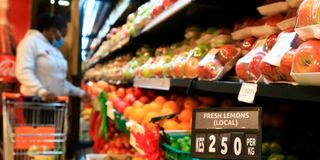Hard times call for review of taxes in Finance Bill ’22

A customer picks fruits at a supermarket in Nyeri on August 7, 2021. Key economic players have expressed concerns over the rising inflation.
What you need to know:
- Should Parliament approves the bill, it will be forwarded to the President for assent, after which the proposals will come into effect.
- The Bill seeks to remove maize flour, cassava flour, wheat flour and meslin flour from the list of tax-exempt goods.
Recently, the National Treasury Cabinet Secretary tabled the Finance Bill 2022 in Parliament with main focus on increasing the government’s revenue, which is key for fiscal consolidation. That came two months earlier, in April, as compared to June in previous years to provide ample time for debate ahead of the general election.
Should Parliament approves the bill, it will be forwarded to the President for assent, after which the proposals will come into effect. The following are some of the proposals of the bill in question, which went through the First Reading on April 13.
First, it proposes to increase digital service tax (DST) from 1.5-3 per cent of consideration received in respect of the service provided in the case of a digital service provider or the commission or fee paid for the use of a platform in the case of a digital marketplace provider, excluding value added tax (VAT) . It also seeks to exempt non-resident entities with a permanent establishment in Kenya from DST.
The increased DST is commendable; it will see the government tap more into the growing online economy and get a share of multinationals’ revenues. But the increased taxes will be passed on to the end users and increase the cost of online transactions.
Secondly, it seeks to remove maize flour, cassava flour, wheat flour and meslin flour from the list of tax-exempt goods under the Second Schedule to the VAT Act 2013. This would see these goods subjected to VAT at 16 per cent, subsequently increasing food prices.
Increase excise duty
The implication of that will be higher cost of living with maize flour being a staple meal. It will exert upward pressure on the inflation basket as food is a headline contributor to Kenya’s inflation.
Thirdly, it seeks to increase excise duty on goods such as bottled water and non-alcoholic beverages by 9.5 per cent to Sh6.6 per litre (from Sh6). Excise duty on fruit and vegetable juices will increase by 9.3 per cent to Sh13.3 per litre (from Sh12.2).
It also seeks to increase excise duty on items like cosmetic and beauty products, powdered beer and spirits. If passed, the contribution of excise duty tax to total tax revenue would increase from 13.8 per cent.
Fourthly, the bill proposes to increase Capital Gains Tax (CGT) on transfer or sale of property by an individual or company from5-15 per cent. The Finance Bill 2019’s proposal to increase CGT to 12.5 per cent was rejected by Parliament. A higher CGT rate would result in increased dealing and transaction costs.
The bill also seeks to tax gains from financial derivatives for foreigners under the CGT rate of 15 per cent. That will worsen their uptake, which has been slow since their introduction in 2019.
These aggressive revenue collection measures are aimed at reducing the fiscal deficit from 11.4 per cent of GDP to 6.2 per cent for Financial Year 2022/2023. But some of the proposals will hurt Kenyans more, given the current economic conditions. Therefore, this bill should be scrutinised well and some proposals be reconsidered before approval.
Mr Wamayuyi is an economic researcher. [email protected]





